Steve Carell Crazy, Stupid, Love
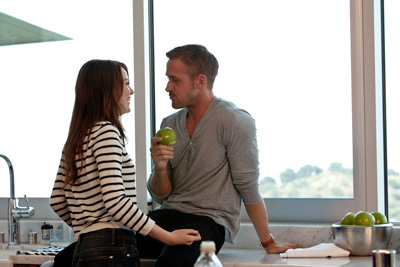
Crazy, Stupid, Love
Cast: Steve Carell, Ryan Gosling, Julianne Moore
Director: Glenn Ficarra, John Requa
Genre: Comedy, Drama, Romance
Rated: M
Synopsis: At fortysomething, straight-laced Cal Weaver (Steve Carell) is living the dream - good job, nice house, great kids and marriage to his high school sweetheart. But when Cal learns that his wife, Emily (Julianne Moore), has cheated on him and wants a divorce, his "perfect" life quickly unravels. Worse, in today's single world, Cal, who hasn't dated in decades, stands out as the epitome of un-smooth. Now spending his free evenings sulking alone at a local bar, the hapless Cal is taken on as wingman and protege to handsome, thirtysomething player Jacob Palmer (Ryan Gosling).
In an effort to help Cal get over his wife and start living his life, Jacob opens Cal's eyes to the many options before him: flirty women, manly drinks and a sense of style that can't be found at Supercuts or The Gap. Cal and Emily aren't the only ones looking for love in what might be all the wrong places: Cal's 13-year-old son, Robbie, is crazy about his 17-year-old babysitter, Jessica, who harbors a crush on Cal. And despite Cal's makeover and his many new conquests, the one thing that can't be made over is his heart, which seems to keep leading him back to where he began.
Steve Carell Crazy, Stupid, Love in cinemas: 29th September, 2011
Website: www.crazystupidlovemovie.com.au
About the Production
JACOB
Cal, you've got a kind face.
You've got a good head of hair.
You seem like a nice guy.
I'm going to help you rediscover your manhood. Do you have any idea when you lost it?
CAL
Whether you're middle-aged marrieds on the brink of divorce, a passionate young couple in your twenties or thirties, or teenagers with your first real crush, love can make you do crazy, stupid things.
Steve Carell, who stars in and produces the film, says, "Age usually denotes some sort of growth, some sort of leg-up on the learning curve, but that's not always the case when it comes to love. This is a great story because it involves three different generations of romance. What I found really interesting to explore was the crossover between them and the idea that, even as we get older, we don't always have all the answers. The lessons we can learn from our kids are sometimes the most surprising."
Steve Carell's character in "Crazy, Stupid, Love." is Cal Weaver, a man whose life falls apart in the opening scene when, without warning, his wife announces she wants a divorce. Having the rug pulled out from under him without warning, he flails around, trying to find his footing, when he's offered an unexpected and unusual lifeline in the form of ladies' man Jacob Palmer, played by Ryan Gosling.
Glenn Ficarra, who directed the film with John Requa, states, "This is a story about a guy who has a mid-life crisis thrust upon him as opposed to coming to it naturally, and the domino effect it has on everyone around him."
In addition to the details of the story and characters, the overarching theme of love, present in so many different forms, was a big draw for the directing duo. John Requa contends, "Love is vital. For most people, it's really the most important thing, the greatest thing in life worth fighting for. But it can also be a great source of comedy, which is how we felt when we read the script."
The screenplay, written by Dan Fogelman, "was one of the best I've ever read," says producer Denise Di Novi. "It was funny, very witty, very smart. It took a clear look at human relationships-marriage, parenting, first love, long-term love-in a way that was dramatic and edgy and hilarious…an irresistible combination for me."
Dan Fogelman actually wrote the screenplay with Steve Carell in mind for the character of Cal. "I had the initial idea of a guy whose wife leaves him, and he meets another guy in a bar, and that guy trains him to become a sort of older version of himself, to rediscover his manhood and, well, pick up women. I could instantly imagine Steve Carell playing him."
To round out the story and characters, the writer drew from his own experiences. "I'm in my thirties, I'm single, I've been through the wringer just like everyone," he smiles. "I also have many friends who are married and have kids. People love to give you advice. So I just compiled all of the things I knew and heard and created Cal as this 'everyman' character in need of some guidance and Jacob as something of a guru."
Dan Fogelman's script became the first project to be produced under Steve Carell's own Carousel banner, with partners Vance DeGeneres and Charlie Hartsock serving as executive producers on the project. Both filmmakers saw the story's appeal right away. "Everything was hidden so nicely inside the script, and every time I turned the page I was excited to find out what would happen," Charlie Hartsock says. "But what really impressed me was that I never felt ahead of the script, I never thought, 'Oh, I see where this is going.' That made reading it even better." 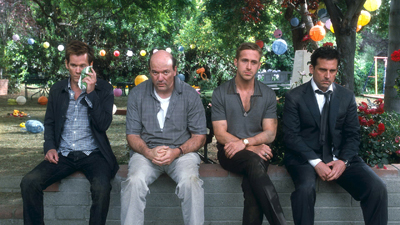 Vance DeGeneres offers, "The humor comes very naturally out of the situation and the character. Cal was very real and his story-his relationship falling apart after years of marriage-was something a lot of people can relate to. It really fit with what Carousel is all about."
Vance DeGeneres offers, "The humor comes very naturally out of the situation and the character. Cal was very real and his story-his relationship falling apart after years of marriage-was something a lot of people can relate to. It really fit with what Carousel is all about."
It was also precisely the kind of movie that directing partners John Requa and Glenn Ficarra, who have previously only directed their own material, couldn't pass up. Notes Glenn Ficarra, "We have a common ear for what we like, and there were issues in this story-mid-life crises, family dynamics-that really rang true and were very tempting to us."
"I liked the way Dan Fogelman examined how annoying love can be," John Requa says. "The script was just so impressive, and it's a character-based comedy, which is exactly what we like to do."
Denise Di Novi states, "Glenn Ficarra and John Requa have a style that we all felt would match perfectly with this project. They're really able to access the underlying emotion of a scene, even through the laughter. They bring a real sense of humanity to what they do."
A team in the true essence of the word, the entire cast and crew came to find that the directing pair were so much on the same wavelength that they would complete each other's sentences, or offer up an idea half a second before the other did. "We've been working together for something like 23 years, so we really do think alike at this point," Glenn Ficarra admits.
In addition to having a cohesive vision, the team was able to double their efforts in other areas.
"We had so many brilliant people in this cast," John Requa relates, "that it was really just about showing up and letting them do their thing."
EMILYI don't know when you and I stopped being 'us.' I mean, do you?
CAL
Maybe it's when you screwed David Lindhagen.
After 25 years of marriage, Cal Weaver's wife, Emily, suddenly asks him for a divorce, revealing she's had an affair. For suburban insurance man Cal, who apparently hasn't paid much attention to his wife-or his life-lately, the news comes completely out of left field, setting him on a road to discover just where he might've left the man he used to be. The first stop on that path: drowning his sorrows in fruity cocktails sipped from tiny straws at a local bar, where he sticks out like the poor schlub he's become.
"Up until that very moment, Cal is happy and content in his marriage, so he is totally blindsided by Emily's declaration," affirms Steve Carell. "It completely catches him off-guard, and he can't really think. He needs to reevaluate his entire life, and figure out what he's going to do. Is he just going to give up? Is he going to get back out there? I mean, this is a guy who's been married for many, many years."
Cal gets help reinventing himself from an unexpected and, at first, unwelcome source, the very single, very self-assured Jacob Palmer, played by Ryan Gosling.
Unbeknownst to Cal, the dashing local playboy has been watching him bore the bartender with his sob story night after night.
After a while, Glenn Ficarra says, "Jacob refuses to continue to let Cal wallow in misery. But not because he feels sorry for him; mainly, he just doesn't want to have to watch." "Our first order of business was casting Jacob, because the Cal-Jacob relationship is pivotal to the film," Denise Di Novi says. "We didn't necessarily associate Ryan Gosling with comedy, but I think because the characters in this movie have so much depth and are so complicated and so rich, and because there are dramatic elements to the story as well, he thought he could really sink his teeth into it. And then, of course, we realised how funny he is."
Steve Carell recalls, "Ryan Gosling is so fantastic, and it struck me from day one how comedically gifted he is. And as funny as he could be, he also made a character that was cocky and arrogant so endearing."
Returning the compliment, Ryan Gosling says, "One of the things I loved about working with Steve Carell is that he acclimates himself to your sense of timing, which is a very generous way to work."
To play Jacob, Ryan Gosling did his homework. "He's really kind of a jackass," he shares, "a knucklehead with a heart of gold who has this sort of twisted wisdom he thinks he should pass on. So I watched this TV show about a pick-up artist and read a couple of books about foolproof strategies for hitting on women. They are kind of terrifying, but I did manage to get some inspiration from them for Jacob."
"We were awed by Ryan Gosling," John Requa says. "His insights into the character and the story were remarkable, and the interplay between him and Steve Carell was just perfect." Glenn Ficarra concurs. "They had a definite chemistry and really enjoyed working together, so for us it was just a matter of capturing that."
No matter how much Cal changes on the outside, inside he's still brooding over Emily. To portray Cal's about-to-be ex-wife, the filmmakers needed to find someone who would remain both sympathetic and likeable, despite the fact that she has seemingly ruined Cal's life. Casting acclaimed actress Julianne Moore was an easy choice.
"Like Ryan Gosling, she's not exactly known for comedy, but she has such effervescence about her," Denise Di Novi says. "She brought so much to the part, so much humor to the heartache. She played Emily with grace and charm. You can see why Cal views her as his soulmate."
"Cal and Emily have been married for a long time but have become kind of disconnected," Julianne Moore relates. "I loved that this story started with that, where they are past 'how do I meet this person and fall in love with them and get married?'-so far past it that they are moving away from each other."
Julianne Moore felt that the various facets of the story-divorce included-made this a modern, relatable film for audiences. "I think that people go to movies to see themselves, particularly with this genre. We want to laugh, we want to fall in love, but with the reality of marriages today, it's natural to present that side of relationships, too. Families are complicated and I liked that this wasn't going to be a traditional romantic comedy, but that it explored all sides of love."
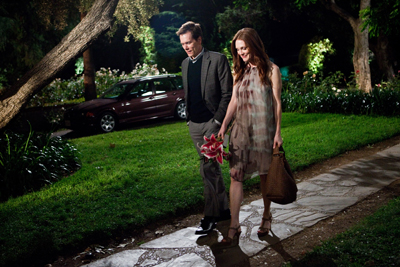 Despite the friction between Cal and Emily, Julianne Moore enjoyed working with Steve Carell, whom she says "not only made me laugh, but was a really thrilling acting partner because he truly knows how to mine even the most nuanced bits of absurdity out of every moment."
Despite the friction between Cal and Emily, Julianne Moore enjoyed working with Steve Carell, whom she says "not only made me laugh, but was a really thrilling acting partner because he truly knows how to mine even the most nuanced bits of absurdity out of every moment." The feeling was mutual. Says Steve Carell, "She's the sweetest person, one of those people that you feel like you've known forever, even if you've just met. So when her character betrays mine in the film, of course I had to be mad at her, but it was really hard to do."
As a natural consequence of their actions, Cal and Emily are forced to contend with the questions and emotions of their two young children, Robbie, age 13, and Molly, who is just 10, played, respectively, by Jonah Bobo and Joey King.
Until his parents' separation, Robbie has always viewed the idea of love through rose-colored glasses, seeing his mom and dad's marriage as the ultimate love story. When they split up, the young boy ironically becomes Cal's voice of reason. "One of the things that most interested me in the script was the character of Robbie," John Requa says. "He reminds us of that feeling of being in love for the first time, not jaded by years of heartbreak that the rest of us have been through. He has this great purity about him when it comes to that."
In casting the pivotal part, the filmmakers sought a young actor with a great deal of maturity, and found him in Jonah Bobo.
Jonah Bobo found the complexity of the character to be a fun challenge. "It's a hard time for Robbie. His parents are getting divorced, which was really unexpected." At the same time, Robbie's having romance problems of his own. "He's completely in love with his babysitter," the actor confirms, "who's only a few years older than him, so in his mind, he's totally got a chance. But then he finds out that she's in love with his dad. It's a lot for one kid to deal with."
Jonah Bobo may have been one of the youngest members of the cast, but he earned the respect of his veteran castmates.
"Jonah Bobo was truly so good in the role that it didn't feel like working with a kid at all," Steve Carell says. "He's a terrific actor for any age."
According to Dan Fogelman, "The theme of the movie is probably best summed up by Robbie, in that the older we get, the harder it is to keep sight of the one simple truth that exists out there: true love is the only thing that matters, and you fight and fight and don't give up until hopefully it all works out for you…knock on wood. Robbie, going through his first big crush, still gets that."
The object of Robbie's devotion is his 17-year-old babysitter, Jessica, a selfconscious teen immersed in her own first infatuation, who unwittingly comes between Cal and Robbie. The filmmakers cast fresh-faced Analeigh Tipton as Jessica. Playing her first major film role, the actress admittedly had a few butterflies, but funneled that energy into the part.
"Jessica is sort of an awkward girl, unsure of herself, so whenever I felt nervous, I just went with it, and let my own jitters become hers," Marisa Tipton reveals. Although it's unintentional, Jessica is the first person to hear about Cal and Emily's separation and the main reason for it: Emily's fling with a coworker, whose very name becomes the bane of Cal's lonely existence…David Lindhagen.
In spite of being cast in the role of a home wrecker, Kevin Bacon appreciated the humanistic way in which the character was drawn. "He's basically a kind, pretty simple, straightforward guy who is really in love with Emily," Kevin Bacon notes. "It was a nice twist that the 'other man' wasn't a jerk."
Denise Di Novi felt it was crucial for the character-and the actor playing him-to make you believe Emily would leave her husband for him. "David Lindhagen isn't a clichéd bad guy, and Kevin Bacon never played him as one. He made him sexy and fun and attentive, presenting a viable option for her by having some of the qualities that Cal seemed to have lost over the years."
The same tenet held true when casting the part of Kate, Cal's first postseparation fling. He meets her at the bar and, attempting to use Jacob's well-honed lines, reels her in. Kate needed to be a credible option for Cal, and so the filmmakers were thrilled to cast Marisa Tomei in the part.
Denise Di Novi says, "Kate is a really 'out there' part, and it needed an actress who would really go for it. And Marisa did. She and Steve were just combustible together. Some of the funniest scenes in the movie are between the two of them." "I think this movie really shows what fools we can be for love," Marisa Tomei asserts. "Kate just wants to meet somebody-probably anybody-and so does Cal. And when his initial desperation and pathetic attempts to flatter her don't work, he turns to brutal honesty, and that's something she didn't expect. But she likes it."
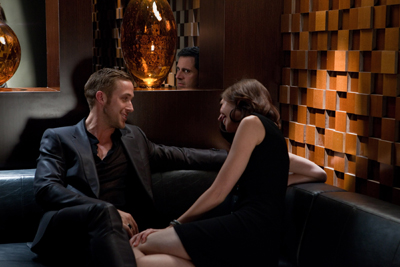 Honesty was never the best policy for Jacob, until he meets Hannah. Unlike all other women, she is somehow immune to his charm and his best pick-up lines, and has no trouble resisting Jacob's full court press…for a while, anyway.
Honesty was never the best policy for Jacob, until he meets Hannah. Unlike all other women, she is somehow immune to his charm and his best pick-up lines, and has no trouble resisting Jacob's full court press…for a while, anyway. "She is studying for the bar exam and has a boyfriend, Richard, who's also a lawyer," says Emma Stone, who plays Hannah. Josh Groban makes his feature film acting debut as Richard.
"But," Emma Stone acknowledges, "as a suitor, Richard is kind of boring, and Hannah's approaching a crossroads in her life, trying to figure out whether to stay with the safe guy or go a little wild. She does see that Richard's very sweet, and that there are probably a lot of girls who would be all about Richard."
Even as she's hoping for something more with him, Hannah's realising that she is indeed perhaps a little wilder than she's really allowed herself to be, that maybe she's too young to settle for someone so…settled.
"It's possible that she needs someone a little spicier-and if you're looking for spice, Jacob's got it. He's the whole rack," Stone laughs. "Emma Stone is one in a million," Di Novi states. "She brought so much energy and curiosity and intelligence to Hannah, and those are precisely the qualities which spark Jacob's feelings for the character."
"They just have some kind of unavoidable chemistry, even though she tries hard to avoid him," Emma Stone adds. "Of course, every girl has had some flutters for the Jacob type at least once in her life, so Hannah figures, 'What harm is there in indulging that, just once?'"
There's certainly one girl who thinks Jacob is an indulgence worth considering. Trying to stoke Hannah's interest in Jacob is her friend Liz, played by Liza Lapira. Liz believes Hannah deserves someone much more exciting than Richard. Rounding out the main cast of "Crazy, Stupid, Love." are John Carroll Lynch and Beth Littleford, who play Jessica's parents.
The directors were thrilled with the caliber of talent they assembled for the film. "Steve Carell, Ryan Gosling, Julianne Moore, Emma Stone… Everyone from the adults to the kids just knocked it out of the park," Geoff Ficarra says.
JACOB
One of the best parts about being a guy your age-and frankly, there aren't many, so you should take full advantage of it-is that you can rebuild your entire wardrobe with like 16 items.
For screenwriter Dan Fogelman, one of the most telling moments in "Crazy, Stupid, Love." occurs in the opening scene, when Cal and Emily are at dinner, before a word is spoken.
"Coming from animation, I've always worked to tell stories very visually. If you turn down the volume completely or take away all of the dialogue I work so hard on," he kids, "you should still be able to understand the dynamic of what's happening in a scene."
Referring to a shot of Cal and Emily's feet under the table at a very nice restaurant, Dan Fogelman notes, "Cal's wearing old sneakers and Emily's wearing her pretty heels, and there's a distance between their feet. Right away you have a clue that something is off, and then when he starts talking about crème brûlée and she's talking divorce, you have confirmation that their marriage has gone off the rails."
A large part of the laissez-faire attitude Cal has developed over time is reflected not only in his choice of footwear, but in his overall fashion sense-or lack thereof. "Cal has a look that is not dissimilar to my personal look when I'm not acting, which is kind of big baggy pants, shirts that don't necessarily fit, $13 haircuts, and sensible shoes," Steve Carell says, only half-kidding. "In truth, his style is a non-style, a complete disinterest in style or his own personal appearance. He's just given up trying to look good, and I think that's reflected in his relationship and in his self-esteem in general."
Jacob's mission to remake Cal begins with a trip to the mall. "Jacob is like a dating black belt," John Requa explains. "He's reached the ninth level of womanising and has refined his technique to an absurd level, whereas Cal is the exact opposite. It's really a comedy of opposites, which is most immediately apparent by each man's physical manifestation."
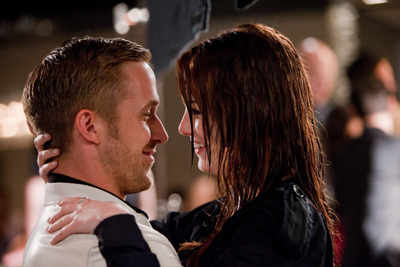 Geoff Ficarra reasons that "because alpha-male Jacob thinks of himself as a gift to women, he takes great pains to wrap himself up just right. But in a way he is like Cal, because they've both gotten a little lost behind their respective façades."
Geoff Ficarra reasons that "because alpha-male Jacob thinks of himself as a gift to women, he takes great pains to wrap himself up just right. But in a way he is like Cal, because they've both gotten a little lost behind their respective façades." To put a fresh spin on a makeover, the filmmakers turned to costume designer Dayna Pink, who enjoyed the challenge of defining the different looks. "Jacob is the cool guy who knows a lot about a lot of things," she says. "He drinks the best coffee, drives a great car, eats in the hottest restaurants… So he wears a lot of suits, and never wears jeans." Dayna Pink dressed Gosling primarily in youthful, edgy designers like Simon Spurr, Albert Hammond Jr., Gossuin, Alexander McQueen and YSL.
Cal's transformation would happen in stages. "We see him getting a whole new wardrobe with lots of tailored pieces, and then we see him settling into it, learning what looks good on him and finding his own style." For Steve Carell, Dayna Pink chose such sophisticated designers as Canali, Zegna, Burberry, Etro and Prada.
As Cal starts to dress better and to take better care of himself, he begins to feel better about himself overall. Steve Carell felt this was a turning point for the character. "His new sense of style and way of thinking take him out of the stagnant guy he had become, and that's what women respond to," he says. "Anybody can change their clothes, but he really needed to change his demeanor."
Dayna Pink says Steve Carell was one of her favorite actors to dress because "when you put Steve in something fantastic, he just lights up." Two pieces stood out in her mind as working a particular magic on him. "When we first see him in the bar after his makeover, he is wearing a blue Canali blazer, and later, he's in a suit at his son's graduation. Both outfits were simple, neither had a tie, but he looked so elegant that I couldn't help but think how great he must have felt."
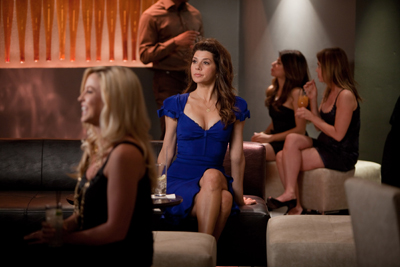 JACOB
JACOBYou think she came to a crowded bar to have a quiet drink alone? She's hunting.
"Crazy, Stupid, Love." was filmed almost entirely on location in and around Los Angeles, with stand-out locales including the Westfield Century City Shopping Mall, where Jacob takes Cal on his spending spree, and the famed Christophe Salon, where Cal receives his updated hairstyle. Ventura Boulevard's Pinot Bistro opens the film as the site of Cal and Emily's ill-fated dinner.
The Weaver house was also a practical set, located in Altadena. Production designer William Arnold says, "We were really lucky to find that house, which had this beautiful back sun porch. The owners graciously let us tear down their old glass doors and put in windows and doors that opened the house up to the backyard, lending itself to Cal's late-night 'visits' to his garden. He could see almost all the way through the house, but was, tellingly, on the outside looking in."
Cal's beloved garden plays a major role in our understanding of the character. William Arnold notes, "When his marriage breaks up, at first he channels his emotions into concern about his yard."
The design team had a good greens man on board who helped shape the landscaping to the production's needs. "We just enhanced its appearance, and put up a fence along the back to make the area a more workable scale to the house." When Cal moves out, he moves in to a small apartment, which was one of just two sets built on a soundstage at the Warner Bros. Studios lot. The filmmakers and William Arnold wanted it to be the complete contrast of the home he'd just left, which included his well-tended yard.
"The apartment could have no greenery, particularly inside," William Arnold emphasises. "It was just beige-on-beige-on-beige. And on his patio outside, we actually put a dead tree. I felt that, for him to have to look at that dead tree… It would be a subtle reminder every day of what was happening to him."Jacob's home also reflected his current lifestyle. To serve as his stunning, if stark, bachelor pad, the filmmakers chose the renowned Skyline Residence designed by internationally recognised architect Hagy Belzberg. Located off the Sunset Strip in the Hollywood Hills, the glass-enclosed, ultra-modern home is considered a prime example of world-class contemporary architecture. As no one was residing in the home at the time, it was easy for Willia, Arnold and his team to make the few necessary adjustments.
"We just removed what we didn't need, and put in a few of our own signature furnishings, leaving it somewhat austere," he says. "Jacob's house is a comment on the character's own emptiness, really. He rattles around in there; it's very impersonal, yet very tasteful."
Among the most significant sets in the entire film is the bar, called Plus, which is where Hannah meets Jacob, and where Jacob turns his mentoring sights on the rudderless Cal. The bar was constructed on Stage 19 on the Warner Bros. lot. "Realising how much of the film would be shot in the bar, we knew right away it had to be a set and not a location," William Arnold offers. "A lot of Cal's metamorphosis unfolds there, and we needed to be able to show that." To convey the passage of time and Cal's inner transformation, Requa and Ficarra, together with director of photography Andrew Dunn, conceived a series of shots with a motion-controlled camera mount that allowed them to track the progression in a fluid way.
In designing Plus, the directors and Arnold did extensive research, reviewing photos from numerous books and visiting several clubs, restaurants and bars in the L.A. area. "We went during the day, though, so it wasn't as much fun as you might think," he quips. "But it was great to walk into each room and get a sense of the space, especially knowing we were going to have to build a fairly large set to accomplish all our needs."
The filmmakers wanted Plus to look primarily like Jacob's type of place. The bar itself included hard surfaces, white stonework, amber-toned glass, and was very elegant. In keeping with the name, they installed plus sign-shaped wood blocks along the far walls near the booths. "The blocks provided a softer surface, up-and-down planes that Andrew Dunn was able to light and to create some interesting, shifting patterns."
Beyond creating a diverse working environment for the cast and crew, the filmmakers were intent on establishing a planet-friendly "green" production as well. To that end, they employed a brand new, state-of-the-art, 53-foot solar trailer as their base camp, supplying power to each of the cast, office, wardrobe and makeup trailers and more. The base camp was operated by Robert Meisner, who frequently adjusted the panels to track as much sunlight as possible in the trailer. In addition to saving energy and costs, one of the benefits of a solar-powered system is that, while generating energy, it doesn't generate noise or vibration.
"Base camp is usually a pretty noisy place, but the solar power made a huge difference," Glenn Ficcara comments. "So not only was this a great experience from an environmental viewpoint, but as a director, it really did make for a nice, quiet set." Requa agreed. "I thought the solar base camp was maybe the coolest piece of equipment on the movie. I was really proud to be a part of a film that was going so far to try to make a difference environmentally, because it's an important issue."
Taking their proactive approach to the next level, sustainability coordinator Rani Woods saw to it that other areas of the production also utilised as many biodegradable or reusable products as they could. For example, food services used plates, cups and flatware made of potatoes or corn, which could easily be composted back into the earth.
Construction coordinator John Samson and his team also selected as many materials as possible for the sets that could later be repurposed elsewhere, not just destroyed. And, rather than make countless individual plastic water bottles readily available throughout the set, cast and crew were given reusable bottles to keep and refill at a main water source, instead of tossing them after one use and starting another. Over the course of filming, the solar-powered base camp and other green initiatives were central to the production, whether on the lot or on location. Most of the principal photography took place in the San Fernando Valley, including Taft High School in Woodland Hills, Portola Middle School in Tarzana and Grant High School in Van Nuys, which stood for Robbie and Jessica's campuses. Equinox Fitness in Woodland Hills doubled as the sports club where Jacob takes Cal to work out, and El Torito Grill at the Sherman Oaks Galleria plays a recurring role in Hannah and Richard's relationship.
CAL
You like her?
ROBBIE
I like Pringles. This girl, she's incredible. She's my soulmate.
From a first crush to a crushing breakup and everything in between, relationships are the focus of "Crazy, Stupid, Love."-a coming-of-every-age comedy.
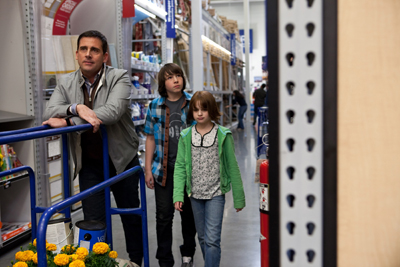 "In addition to how funny it was, I really liked the movie's theme of true love, that there is a soulmate for every person, and that you should be willing to fight for that person no matter what," Steve Carell says. "If love doesn't conquer all, it conquers most things, and thanks to the resilience of the human heart, we can find a way to make it work, to find that love again, or a different love. The spirit of the story is very hopeful and very sweet."
"In addition to how funny it was, I really liked the movie's theme of true love, that there is a soulmate for every person, and that you should be willing to fight for that person no matter what," Steve Carell says. "If love doesn't conquer all, it conquers most things, and thanks to the resilience of the human heart, we can find a way to make it work, to find that love again, or a different love. The spirit of the story is very hopeful and very sweet." Denise Di Novi agrees, "This film tells a story-several, really-about how hard it is to make it work with another person, but how worthwhile it is to hang in there. There's someone out there for everybody, and I think audiences will really connect with that and enjoy laughing and even crying along with these characters."
John Requa reflects, "Love is this incredible force that we all try to quantify, that we all struggle with, and this film really shows different ends of the spectrum: Cal, on one end, had a love that was this vital part of his life that he took completely for granted, and then for Jacob, it's almost something to be afraid of."
"The story not only has a lot of laughs, but also a lot of heart," Glenn Ficarra concludes. "I think the different perspectives on the same subject will give every moviegoer something to relate to. Let's face it, we've all been there."
MORE
- Emma Stone Magic in the Moonlight
- Jessica De Gouw Cut Snake
- Maxine Peake Funny Cow
- Denzel The Equalizer 2
- Johnny Flynn Beast
- Logan Marshall Green Upgrade
- Shailene Woodley Adrift
- Eric Toledano and Olivier Nakache C'est La Vie...
- André Leon Talley The Gospel According To André...
- Shakespeare In Tokyo
- Mission: Impossible Fallout
- Glenn Close The Wife
- Allison Chhorn Stanley's Mouth Interview
- Benicio Del Toro Sicario: Day of the Soldado
- Dame Judi Dench Tea With The Dames
- Sandra Bullock Ocean's 8
- Chris Pratt Jurassic World: Fallen Kingdom
- Claudia Sangiorgi Dalimore and Michelle Grace...
- Rachel McAdams Disobedience Interview
- Sebastián Lelio and Alessandro Nivola...
- Perri Cummings Trench Interview



